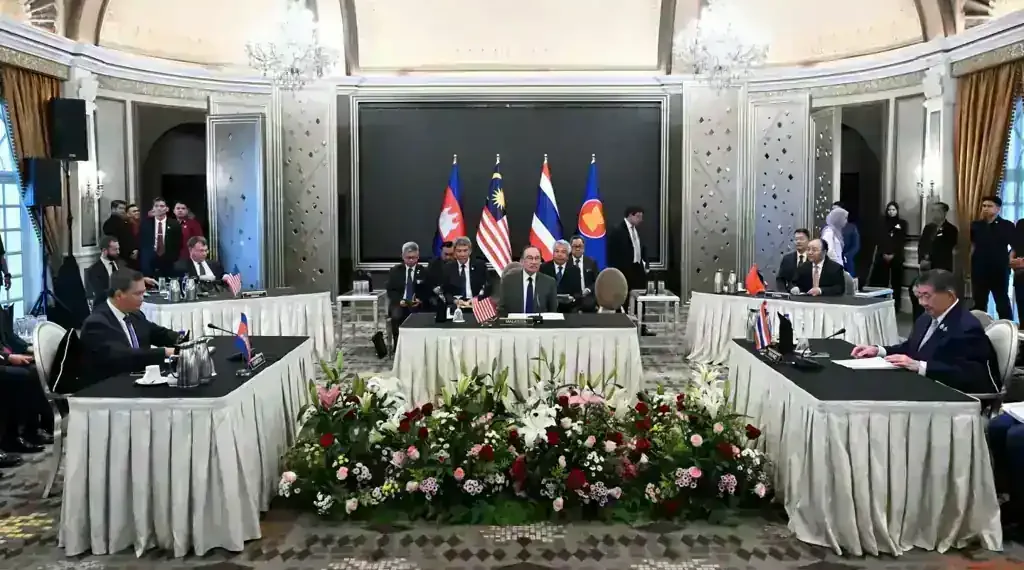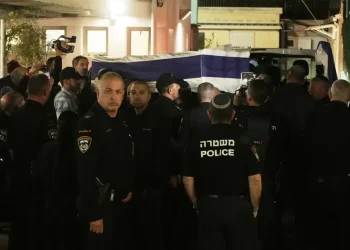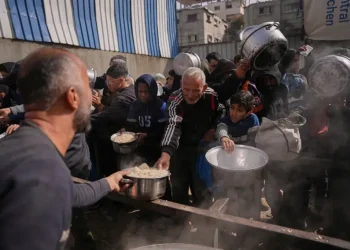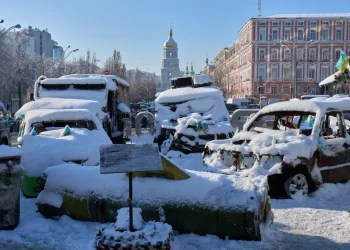Thailand and Cambodia agree to unconditional ceasefire following deadly border clashes
Written: July 28, 2025, 17:00 EDT
Thailand and Cambodia have reached an unconditional ceasefire following five days of deadly border clashes that left dozens dead and forced hundreds of thousands to flee their homes. The agreement, announced in Malaysia and brokered with support from ASEAN and international partners, marks a significant step toward restoring peace and stability in the region.
The ceasefire, effective from midnight local time, was jointly declared by the acting Thai Prime Minister Phumtham Wechayachai and Cambodian Prime Minister Hun Manet following high-level talks hosted by Malaysian Prime Minister Anwar Ibrahim.
Ceasefire brokered after five days of border violence
The recent escalation began Thursday when a land mine explosion injured five Thai soldiers near the disputed border. Tensions quickly flared, with both sides exchanging fire and accusing each other of provoking the violence. According to local officials and media reports, at least 35 people have died and more than 260,000 residents on both sides of the frontier were displaced as a result.
In a press conference in Putrajaya, Malaysia, Prime Minister Anwar announced that both nations had agreed to an “immediate and unconditional ceasefire.” The meeting was held under the auspices of the Association of Southeast Asian Nations (ASEAN), which Malaysia currently chairs.
“This is a vital first step towards de-escalation and the restoration of peace and security,” Anwar said, emphasizing the importance of dialogue and regional unity.
Next steps for restoring peace and regional stability
As part of the ceasefire agreement, military officials from Thailand and Cambodia will meet on Tuesday to further reduce tensions along the border. Cambodia will also host a border committee meeting on August 4 to continue diplomatic discussions.
Additionally, foreign and defense ministers from the three countries — Cambodia, Thailand, and Malaysia — have been tasked with developing a formal mechanism to monitor the ceasefire and ensure long-term peace.
Hun Manet expressed optimism about the path forward, stating that he hopes “bilateral ties can return to normal so that the 300,000 displaced villagers may return home soon.” Phumtham echoed this sentiment, adding that the agreement reflected “Thailand’s desire for a peaceful resolution.”
International pressure and diplomatic involvement
The peace talks were held under considerable international attention. The joint statement issued after the meeting acknowledged the participation of both the United States and China. U.S. President Donald Trump had reportedly applied direct pressure on both parties, warning that trade agreements could be suspended if the hostilities continued.
According to the joint communiqué, U.S. Secretary of State Marco Rubio and Chinese Ambassador Wei Fenghe attended the negotiations in Malaysia, demonstrating global interest in resolving the conflict peacefully.
In a public statement, Rubio applauded the ceasefire and reaffirmed Washington’s expectation that “both governments honor their commitments to end this conflict.”
White House press secretary Karoline Leavitt shared the development on social media platform X, writing: “President Trump made this happen. Give him the Nobel Peace Prize!”
Following his return to Bangkok, Thai Acting Prime Minister Phumtham confirmed that President Trump had called to congratulate the Thai government and signaled readiness to resume trade negotiations between the U.S. and Thailand.
Impact on regional diplomacy and ASEAN unity
This flare-up marks a rare instance of open military confrontation between two ASEAN member states. The 10-nation bloc has long prided itself on its principles of non-aggression and regional cooperation. In the wake of the fighting, both Cambodia and Thailand recalled their ambassadors, and Thailand shut down all border crossings—except for routes allowing Cambodian migrant workers to return home.
The violence also stirred domestic unease in both countries, with opposition figures and civil society groups calling for a diplomatic resolution.
By restoring dialogue, ASEAN appears to have reinforced its role as a stabilizing force in Southeast Asia. Political analysts note that the involvement of third-party mediators like Malaysia and diplomatic pressure from the U.S. and China were critical in achieving a swift de-escalation.
Voices from the ground: hopes and fears of evacuees
For those caught in the conflict, news of the ceasefire brought a wave of relief.
At a shelter in Surin, Thailand, evacuee Usa Dasri shared her mixed emotions. “I’m happy and relieved. We miss our home. I’m worried about our livestock and rice fields. But mostly, I want our soldiers to be safe, and to sleep in peace like us,” she said.
Dasri also credited the diplomatic efforts of neighboring countries. “Without outside help, our governments would have struggled to reach an agreement. This gives us hope.”
Across the border in Cambodia, similar sentiments emerged. Chhuot Nhav, a 42-year-old farmer who fled Oddar Meanchey province, said, “I’m happy because I can go back to take care of my animals and send my children back to school.” Still, she remained cautious. “I’ll wait until the fighting really stops before I go back.”
Another evacuee, Kong Sin, said he planned to return to his village on Tuesday if the ceasefire holds.
Historical backdrop: decades of border tension
The 800-kilometer (500-mile) border between Thailand and Cambodia has long been a source of tension. While past clashes have typically been limited in scale, the current conflict drew attention due to its severity and the number of displaced civilians.
The latest round of tension was preceded by a fatal skirmish in May, when a Cambodian soldier was killed in a disputed area. That incident strained diplomatic ties and contributed to the escalation observed in late July.
Conclusion: a tentative step toward lasting peace
While the ceasefire marks a critical milestone, challenges remain. Restoring trust, reopening border crossings, and facilitating the return of evacuees will require sustained cooperation and international oversight.
Still, the agreement offers a hopeful sign for a region often tested by political instability. For ASEAN, the peaceful resolution reinforces its relevance as a diplomatic platform. And for ordinary citizens on both sides of the border, the promise of returning home may soon become reality.
This article was rewritten by JournosNews.com based on verified reporting from trusted sources. The content has been independently reviewed, fact-checked, and edited for accuracy, neutrality, tone, and global readability in accordance with Google News and AdSense standards.
All opinions, quotes, or statements from contributors, experts, or sourced organizations do not necessarily reflect the views of JournosNews.com. JournosNews.com maintains full editorial independence from any external funders, sponsors, or organizations.
Stay informed with JournosNews.com — your trusted source for verified global reporting and in-depth analysis. Follow us on Google News, BlueSky, and X for real-time updates.













